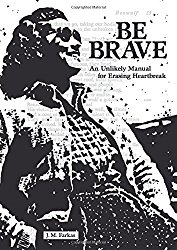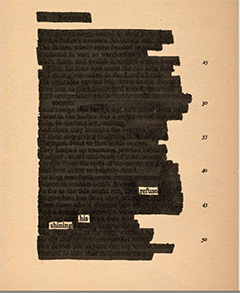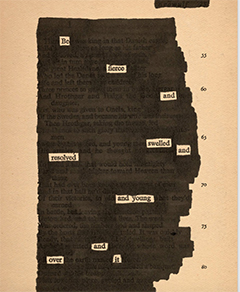
National poetry month is over in the calendar but not in my heart. I’ve spent the last few days savoring Be Brave: An Unlikely Manual for Erasing Heartbreak, by J. M. Farkas. In Be Brave, Farkas applies her black permanent marker to the entirety of Beowulf.

Last October Rachel Stone, writing for The New Republic, declared that while poets have been reassigning meaning to texts in this way for at least a century, erasure has gained new energy at a moment when the country is deeply polarized—when official documents may hold radically different consequences and meanings for different people.
As examples she gives Form N-400 Erasures by Nina Pollari and M. NourbeSe Philip’s 2008 poetry collection Zong!. Zong! is composed from the words of the 1783 legal decision Gregson v Gilbert, in which 150 Africans aboard a slave ship were drowned so the ship owners could profit from insurance. The article notes:
A lawyer herself, [Philip] recognized the way her profession allowed her to squeeze “all extraneous material including emotion and context from an event until you arrived at a desiccated principle of law,” so she applied the same strategy, stripping away words from the source text until its true meaning emerged. “The rest in lives / drowned,” she wrote in Zong! #3, “exist did not / in themselves.
Farkas’s work is a return to the goals that first stimulated erasure poetry in the early sixties (though it’s original can be traced back to the art work of Marcel Duchamp and Dadaism).
In 1921 T.S. Elliot wrote:
We can only say that it appears likely that poets in our civilization, as it exists at present, must be difficult. Our civilization comprehends great variety and complexity, and this variety and complexity, playing upon a refined sensibility, must produce various and complex results. The poet must become more and more comprehensive, more allusive, more indirect, in order to force, to dislocate if necessary, language into his meaning.
Farkas partly wrote the book as a love letter to her 9th grade English students. By her own admission, (in Be Brave’s Introduction) she was no ordinary teacher: ‘On a midterm, I had a multiple-choice section that included questions about the students in my class and the things that they had revealed about themselves or shared during class discussion. I wanted to see if the kids were learning from and paying attention to each other, not just their grades.

Wikipedia (the first source her students might turn to) defines erasure poetry as
Erasure is a form of found poetry or found object art created by erasing words from an existing text in prose or verse and framing the result on the page as a poemThe results can be allowed to stand in situ or they can be arranged into lines and/or stanzas. Erasure is a way to give an existing piece of writing a new set of meanings, questions, or suggestions. It lessens the trace of authorship but requires purposeful decision making.
Most definitions of erasure poetry list it as a sub-genre of Found poetry.
If we look only at definitions I don’t see much difference between the two, except, perhaps, that erasure keeps its source as a visible bedrock, making it more political therefore, more understandable to us now but certain to become more and more opaque to future readers.
Be Brave, however, has all the earmarks of a classic. On the surface it’s about recovering from heartbreak, but Farkas, who is spinning the book off into a series of erased classics, said “I want to spin a feminist-revisionist twist on the classics,” as it never sat well with her that the “canon and the classic high school English syllabus are so expressly male.”
As a former high school English Teacher, Farkas might enjoy the fact that the New York Times now runs a “Found Poetry” contest for teen-aged poets. The deadline for this year’s contest is May 4. The rules can be found here.
